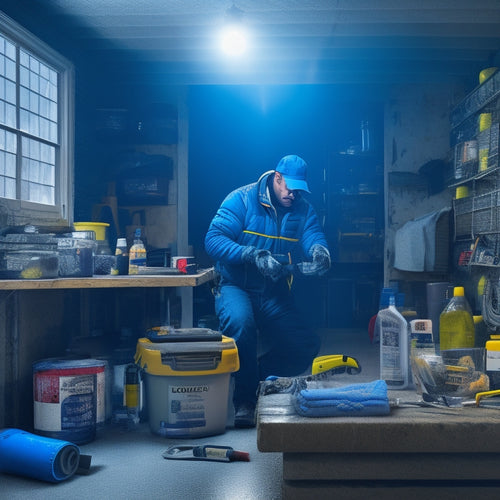
7 Essential Tips for Camper Van Solar Installation
Share
As you start on your camper van solar installation, prioritize careful planning to guarantee a reliable and efficient off-grid energy system. Calculate your energy needs by evaluating power consumption of appliances, lights, and devices. Choose the right solar panel type, considering factors like panel efficiency, shading analysis, and battery capacity. Guarantee proper mounting and electrical connections, avoiding common mistakes like wiring oversights and inadequate grounding. Pay attention to ventilation and overheating, and select components that match your system's requirements. By following these essential tips, you'll be well on your way to a successful installation that meets your unique power needs - and there's more to explore in the world of camper van solar installation.
Key Takeaways
• Conduct an energy audit to calculate total power consumption and ensure the solar installation meets energy requirements for an off-grid lifestyle.
• Choose the right solar panels, considering factors like panel efficiency, shading analysis, and battery capacity, and ensure proper mounting and ventilation.
• Secure and properly size electrical connections to prevent issues, and route cables neatly and securely for cable management.
• Avoid common installation mistakes, such as wiring oversights, inadequate grounding, and insufficient ventilation, which can lead to system malfunctions.
• Optimize energy usage and pay attention to wiring details to prevent system malfunctions and ensure high-quality workmanship.
Assessing Your Camper Van's Energy Needs
Determine your camper van's energy requirements by calculating the total power consumption of your appliances, lights, and devices to guarantee a solar installation that meets your needs. This important step ensures you'll have a reliable off-grid lifestyle.
To do this, you'll need to conduct an energy audit. Energy audit tools, such as calculators and apps, can help you determine your energy usage. Start by listing all the appliances, lights, and devices you plan to use in your camper van, along with their respective power ratings.
Next, estimate how many hours a day you'll use each item. This will give you a total daily energy requirement. Be sure to take into account peak usage times, such as morning and evening when lights and appliances are in heavy use.
Choosing the Right Solar Panel Type
With your energy needs calculated, you can now select a solar panel that meets your camper van's specific power requirements, and there are several types you may want to take into account.
When choosing the right solar panel type, consider the flexibility benefits of flexible panels, which can be easily mounted on curved surfaces or bent to fit unique spaces. These panels are ideal for camper vans with irregular rooflines or limited space.
On the other hand, rigid panels offer better efficiency and durability, making them suitable for larger, flat roof spaces. Aesthetics matter, too - if you prioritize a sleek, streamlined look, consider thin-film panels that blend seamlessly into your van's design.
Monocrystalline silicon panels, while more expensive, offer the highest efficiency rates. Lastly, polycrystalline panels provide a balance between efficiency and cost.
Sizing Your Solar Panel System
When sizing your solar panel system, you'll need to determine how much power your camper van requires.
To do this, you'll need to calculate your daily energy usage, considering factors like your battery capacity, appliances, and personal energy habits.
Assessing Power Requirements
You'll need to calculate your camper van's total power requirements to make sure your solar panel system can meet your energy demands. This involves conducting a power audit to identify all the appliances and devices that consume power in your camper van. Start by making a list of everything that uses electricity, from lights and laptops to refrigerators and water pumps. Note the wattage and average usage hours for each item to calculate the total daily power consumption.
To optimize energy efficiency, consider replacing incandescent bulbs with LEDs and choosing energy-efficient appliances. This will help reduce your overall power requirements and guarantee your solar panel system can keep up with your energy needs.
Calculating Panel Size
To determine the ideal solar panel size for your camper van, calculate your total daily energy consumption in watt-hours (Wh) by multiplying the total amp-hours (Ah) from your power audit by the system's voltage. This will give you a baseline for your energy needs.
Next, consider factors that affect your solar panel's performance, such as:
-
Panel Efficiency: The percentage of sunlight converted into electricity. Higher efficiency means more power per hour of sunlight.
-
Shading Analysis: Identify areas where your panels might be shaded, reducing energy production.
-
Battery Capacity: Make sure your battery can store excess energy generated during the day.
-
Charge Controller: Select a controller that matches your panel's voltage and current output.
-
System Voltage: Choose a voltage that balances energy transmission efficiency with safety considerations.
Selecting the Ideal Mounting Option
When selecting the ideal mounting option for your camper van's solar panel system, you'll need to take into account the available roof space and how it'll impact your mounting style.
You'll want to evaluate the size and shape of your roof, as well as any obstructions, to determine the best mounting approach.
Roof Space Considerations
Your camper van's roof space presents a unique challenge in selecting the ideal mounting option, as it must accommodate the solar panels while ensuring a watertight seal and minimizing wind resistance.
When designing your solar installation, it's important to take into account the limited space and potential obstacles on your camper van's roof.
Here are some essential roof space considerations to keep in mind:
-
Roof Ventilation: Make sure that your solar panel mounting system allows for adequate airflow to prevent overheating and moisture buildup.
-
Obstruction Avoidance: Identify potential obstructions like vents, skylights, or antennas and plan your installation accordingly.
-
Structural Integrity: Verify that your camper van's roof can support the weight of the solar panels and mounting hardware.
-
Clearance and Accessibility: Consider the clearance required for maintenance and repairs, as well as accessibility for cleaning and inspection.
-
Aerodynamics: Opt for a mounting system that minimizes wind resistance and noise while driving.
Mounting Style Options
Selecting the ideal mounting option for your camper van's solar panels involves evaluating three primary mounting styles: fixed, tilt, and adjustable, each with its unique benefits and limitations.
As you assess your options, think about your specific needs and priorities. If you're looking for a cost-effective and simple solution, fixed mounts might be the way to go. However, if you want to maximize energy production, tilt mounts or adjustable mounts could be a better fit.
Tilt kits, for instance, allow you to adjust the angle of your panels to optimize energy output. Additionally, adjustable mounts provide even more flexibility, enabling you to adjust the angle and direction of your panels as needed.
When choosing a mounting style, don't forget to take into account the type of rail clamps you'll need to secure your panels to your camper van's roof.
Ensuring Proper Electrical Connections
You'll need to make sure that all electrical connections between the solar panels, charge controller, and battery are secure and properly sized to prevent overheating and electrical shock. A single faulty connection can compromise the entire system, putting your safety and investment at risk.
To guarantee reliable electrical connections, consider the following key considerations:
-
Cable management strategies: Route cables neatly and securely to prevent damage and tangling.
-
Wire sizing considerations: Choose wires that can handle the maximum current output of your solar panels.
-
Connection types: Select suitable connectors and terminals for each connection point.
-
Insulation and protection: Use heat shrink tubing or electrical tape to insulate and protect connections from the elements.
-
Regular inspections: Schedule regular checks to identify and address any potential issues before they become major problems.
Monitoring and Maintaining Your System
With your camper van solar installation up and running, it's crucial to keep a close eye on its performance to guarantee maximum energy harvesting and prevent potential issues. Regular monitoring guarantees you're getting the most out of your system and catching any problems before they become major issues.
Here are some key aspects to monitor and maintain:
| Aspect | Why It Matters |
|---|---|
| Battery Health | Affects overall system performance and lifespan |
| Charge Controller Performance | Ensures efficient energy harvesting and prevents overheating |
| Inverter Efficiency | Impacts AC power availability and appliance performance |
| System Voltage | Helps prevent electrical shocks and component damage |
| Energy Consumption | Helps you optimize your energy usage and plan accordingly |
Avoiding Common Installation Mistakes
When installing a camper van solar system, paying close attention to detail during the installation process is crucial to avoid common pitfalls.
Here are some common mistakes to watch out for:
-
Wiring oversights: Failing to secure wires properly, using incorrect gauge wires, or neglecting to label connections can lead to system malfunctions.
-
Installation shortcuts: Rushing through the installation process can result in subpar workmanship, which can compromise the entire system.
-
Inadequate grounding: Failing to properly ground the system can lead to electrical shock or even fires.
-
Insufficient ventilation: Inadequate airflow can cause components to overheat, reducing system performance and lifespan.
-
Incompatible components: Using mismatched or incompatible components can lead to system failure or reduced performance.
Frequently Asked Questions
Can I Mix Old and New Batteries in My Camper Van Solar System?
"When you're trying to squeeze every last mile from your camper van's solar system, mixing old and new batteries is like trying to run a marathon with one new shoe and one worn-out one - it won't end well. You'll reduce battery life and cycle depth, making your system less efficient."
How Do I Handle Shading From Trees or Buildings on My Solar Panels?
When you're parked under trees, you'll need to analyze obstruction patterns to minimize tree shading on your solar panels. Conduct an obstruction analysis to identify shady periods, then adjust your campsite or panel angle to maximize energy harvest.
Are Portable Solar Panels a Good Alternative to Rooftop Installations?
Coincidentally, you're considering portable solar panels as an alternative to rooftop installations. You'll appreciate the portability benefits, allowing you to set up and move your panels freely, and flexibility options for maximum energy harvesting.
Can I Charge My Laptop and Other USB Devices Directly From Solar Power?
You can charge your laptop and USB devices directly from solar power using a voltage regulator, but it's safer to use power banks as a buffer to regulate voltage and prevent damage.
Do I Need a Separate Solar Controller for Each Solar Panel?
You're wondering if you need a separate solar controller for each panel. The short answer is no, you don't. In a typical panel configuration, one controller can handle multiple panels, eliminating the need for controller redundancy.
Related Posts
-

Waterproofing Solar Panels for Vehicles: A Step-by-Step Guide
When waterproofing solar panels for your vehicle, start by evaluating your energy requirements and selecting the righ...
-

10 Best Solar Panel Options for Motorhomes Online
When choosing the best solar panel for your motorhome, consider factors like efficiency, durability, and design. You'...
-

5 Ways Bike Sharing Boosts Urban Sustainability
As you explore bike-sharing options, you'll discover five ways it boosts urban sustainability. By reducing congestion...


